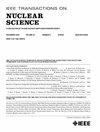用于高能加速器设施辐射估算的深度多任务学习模型
IF 1.9
3区 工程技术
Q3 ENGINEERING, ELECTRICAL & ELECTRONIC
引用次数: 0
摘要
控制潜在放射性设施的辐照剂量对于确保工作人员和公众的安全至关重要。在这篇文章中,我们开发了机器学习(ML)模型来有效估算托马斯-杰斐逊国家加速器设施(JLab)的辐照量,旨在提高加速器设施和公共区域的安全性。在 JLab 的三个实验大厅周围部署了多个传感器。在加速器运行期间,我们收集了传感器位置的单束电流、能级和辐射值数据。我们使用一维卷积神经网络(1D CNN)或长短期记忆(LSTM)网络作为骨干,提出了一种用于辐射估算的多任务学习(MTL)模型。对所提出的模型进行了训练,以同时估算传感器位置的辐射水平。实验结果表明,以 LSTM 为骨干的拟议模型取得了最佳估算性能,同年估算的平均 $R {^{{2}}$ 得分为 0.7557,跨年估算的平均 $R {^{2}}$ 得分为 0.7157。这些结果大大超过了其他竞争模型。本文章由计算机程序翻译,如有差异,请以英文原文为准。
Deep Multitask Learning Models for Radiation Estimation at High Energy Accelerator Facility
Controlling the dose of radiation exposure in potential radioactive facilities is critical for ensuring the safety of staff and the public. In this article, we developed machine learning (ML) models to estimate radiation exposure efficiently at the Thomas Jefferson National Accelerator Facility (JLab), aiming to enhance safety in both accelerator facilities and public areas. Multiple sensors were deployed around the three experimental halls at JLab. Data on single-beam currents, energy levels, and radiation values at the sensor locations were collected during accelerator operation. We proposed a multitask learning (MTL) model for radiation estimation, using either 1-D convolutional neural networks (1D CNNs) or long short-term memory (LSTM) networks as the backbone. The proposed model was trained to simultaneously estimate radiation levels at the sensor locations. Experimental results demonstrated that the proposed model with LSTM backbone achieved the best estimation performance, with an average
$R {^{{2}}}$
score of 0.7557 for estimation within the same year and 0.7157 for estimation across different years. These results significantly surpassed those of competing models.
求助全文
通过发布文献求助,成功后即可免费获取论文全文。
去求助
来源期刊

IEEE Transactions on Nuclear Science
工程技术-工程:电子与电气
CiteScore
3.70
自引率
27.80%
发文量
314
审稿时长
6.2 months
期刊介绍:
The IEEE Transactions on Nuclear Science is a publication of the IEEE Nuclear and Plasma Sciences Society. It is viewed as the primary source of technical information in many of the areas it covers. As judged by JCR impact factor, TNS consistently ranks in the top five journals in the category of Nuclear Science & Technology. It has one of the higher immediacy indices, indicating that the information it publishes is viewed as timely, and has a relatively long citation half-life, indicating that the published information also is viewed as valuable for a number of years.
The IEEE Transactions on Nuclear Science is published bimonthly. Its scope includes all aspects of the theory and application of nuclear science and engineering. It focuses on instrumentation for the detection and measurement of ionizing radiation; particle accelerators and their controls; nuclear medicine and its application; effects of radiation on materials, components, and systems; reactor instrumentation and controls; and measurement of radiation in space.
 求助内容:
求助内容: 应助结果提醒方式:
应助结果提醒方式:


